
Can my local club win promotion in our chess league?
The finale of our quest for promotionIn two previous posts (Part 1 and Part 2), I recounted how my local chess club here in Dublin, Ireland, has battled to win promotion in our local league. Currently, my club, Naomh Barróg, is in division 5, the BEA Cup North and has been trying for several years to win promotion. The winners of the league automatically get promoted while the runners-up go to a playoff.
This year, we spent most of the season in 1st place, but our rivals, Drogheda caught up with us near the end and were one point ahead before the final match. The way the league works is that each team has five players who play an individual game against five players from an opposing team. The scores are then added up and given to each team as points. So, if 4 players on your team win and 1 loses, then you gain 4 points and the other team gets one. If you have 3 wins and 1 draw, then you get 3.5 points.
Our final game was against Skerries and we needed to win as many points as possible.
The greatest of all forks
The game opened with a Petrov Defence and we traded off our e-pawns. My opponent played aggressively, pushing his Kingside pawns and bringing out his Queen early. My position was cramped but Black didn't have enough pieces developed to attack. I decided to play c4 on move 11 to gain some space, which would be useful if Black decided to castle Queenside.
There was also a trap hidden behind my move. I thought my opponent might think they could win the c-pawn because its only defender was my Bishop, which couldn't move because it was pinned to my King. Sure enough, my opponent took the pawn, only for me to give check with my Queen and win the Knight.
I now had a winning advantage and a clear path forward. After castling, my plan was to develop my pieces and then launch an attack on the King down the open c-file. To my surprise, Black offered a trade of Knights on move 15. At first, I wanted to take because why not trade when I'm up a piece? But I looked closer at the position and saw a better move. I had considered Knight to d5 before, but it hadn't worked, but now I saw it won the game. I was simultaneously threatening checkmate and my opponent's Queen. One threat could be neutralised, but not both. It was the greatest of all forks, no matter what my opponent did, I would win the game.
My opponent tried to counter-attack my Queen, but I took his with check and then moved mine to safety. Black tried to play on, but on the next move, I found a tactic that won a pawn and weakened the King's defences. It was the straw that broke the camels back and despite plying on after losing a Knight and then a Queen, it was the loss of a pawn that caused my opponent to resign.
It's all over - or is it?
Although I was delighted with my game, we ended up winning the final match only 3-2. This meant we were only 2 points ahead of Drogheda and sure enough, in their final game they scored 2.5 points. After all our efforts, we lost by only half a point. Worse still, Blanchardstown had a very strong performance in their final games and ended up tying for 1st, pushing us down to 3rd. It was all over and we hadn't got promoted.
Or was it?
When looking over the games of Blanchardstown, we noticed something unusual. Towards the end of the season, a new unrated player showed up playing board 1 on their team. The same player also played on board 1 for Blanchardstown's division 2 team, which would mean they were far too strong for division 5. It's within the rules for players to play in different divisions for the same club, but it's usually only one division above or below, it's very strange to have someone play in one of the highest divisions as well as one of the lowest.
After some research, we found a player with a slightly differently spelt name with a FIDE rating of 1986. Most of the division 5 players range from 1500-1800, so it would be unfair to play someone rated almost 2000. The league organisers were contacted and it turned out that Blanchardstown hadn't declared the true strength of this player. As the player wasn't properly registered, Blanchardstown were penalised points and dropped back to 3rd place.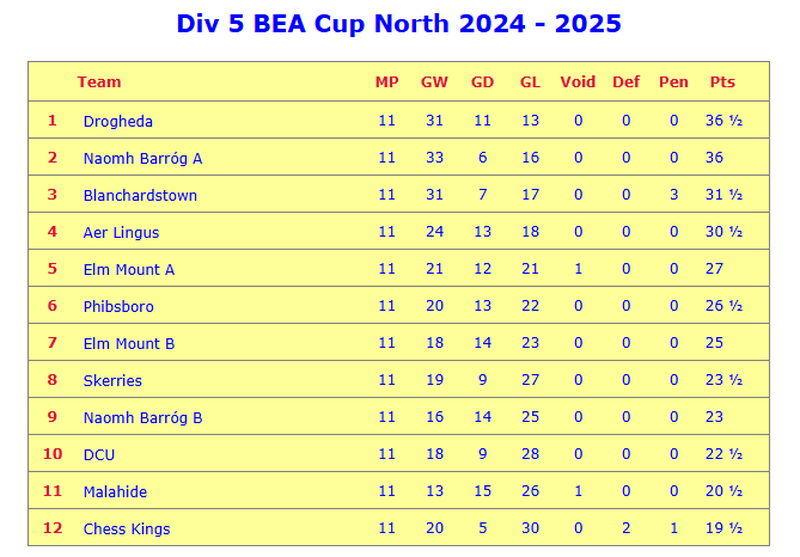
Can we still win?
This brought us back to 2nd place, but then it turned out there was another irregularity that gave us a chance to win the league. One of the clubs in the division is DCU, a group of students from Dublin City University. Anyone who ever been in a college club knows that at the start of the year, there is a huge influx of enthusiastic members but by the end of the year most of these people disappear as they lose interest or get too busy with exams. This was a major problem for DCU and despite having an absurdly large panel with 27 players, for their final 4 matches only half their team showed up.
In their game against Drogheda, only 2 of their players showed up and they gave a walkover on the other 3 boards. In a season which was decided by only half a point, to be given 3 free points is an unfair advantage. In fact, the league has a specific rule about this exact problem. If 3 walkovers are given in a single game and promotion or relegation depends on these 3 points, then a team has a right to challenge the final standing. As it turns out there was an unusually high number of walkovers across the league and nearly every division had some team challenge for either promotion or relegation.
What this meant was that we challenged Drogheda to another game. It took place in their clubhouse and we got 3 games as White and only 2 as Black, but if the final score was a draw, Drogheda would win the game. To be honest, not only is this the most dramatic way to end the league, it is also the fairest. This means the division is won by the best team, not based on a technicality or whether you had the luck for your opponent not to show up.
Losing only makes me play better
The crucial game opened with a rather ordinary Italian game. My opponent began pushing their Queenside pawns early and gained a lot of space. I decided to make some trades to take the pressure off but I miscalculated and blundered. I had two Knights I could move and I choose the wrong one. To my shock and horror, I realised my Knight was trapped and I would lose it for two pawns.
The game had hardly begun and I was already losing. In this crucial match, when I needed to play my absolute best, I had made a silly mistake that could cost me the game. Worse still, my teammate on board 3 resigned around this time, meaning things were looking bleak for our club. But I have a stubborn nature and I don't give up easily, so I knuckled down and tried to convince myself that my position wasn't that bad and I was only down a pawn.
I tried to use the open b-file to launch an attack with my Rook. When my opponent saw through this, I left the a6 and c6 pawns undefended with the hope that if White takes them, I could trap the Queen (the engine says the Queen doesn't get trapped, but there are lines where I force a repetition). Things weren't looking great until my opponent over-extended themselves on move 17. At first it looks like they win a pawn thanks to a pin, but I realised that the fact they haven't castled yet allows me to counter-attack.
My opponent decided to save his Knight so I tore open his Kingside defences. I considered sacrificing the Bishop on f2 to open a line for my Rook, but I couldn't see how to make it work so instead I brought my light squared Bishop to the attack. It turns out that this is a blunder that throws away my advantage and that sacrificing the Bishop was winning. Even still, I felt my attack was so strong that I didn't need to protect my Rook on b8 because the fate of the game was being decided on the other side of the board.
The position by move 22 is very complex with hanging pieces, threats and tactics galore! Instead of moving my threated b6 Bishop, I saved the other Bishop because the threat with my Queen was much stronger. My opponent castled Queenside, which temporarily got the King to safety but as there were no Queenside pawns left to hide behind, he was still left in long-term danger. I missed a tactic to save my Bishop while trapping the Knight, but at the time I was happy to make the trade because I felt I could build a really strong attack and his King was too vulnerable.
Around this time, I saw that my teammate beside me on board 1 was winning his game so it felt like Naomh Barróg was back with our chance to win the league.
My opponent got some checks on my King, but I took care to make sure he couldn't get a repetition. On move 26, I attacked the King with my Rook and my opponent had to sacrifice their Knight because otherwise mate would shortly follow. I brought my Bishop back to defend my King and then went for the kill. I thought my opponent might move their Bishop to b2 on move 31 and think they were winning my Queen, but I saw a line that lead to forced checkmate. My opponent didn't fall for it, but after dancing my Queen around the King, I was able to win the Bishop. Best of all, we were forced to trade off our remaining pieces, which would lead to an endgame I would easily win. Seing this, my opponent resigned.
Did we win?
All that was left was to wait for the other games to finish. We won on board 1, lost on board 3 and had a winning position on board 5 but the other player forced a repetition. So we all crowded around board 4 to see what the final score would be. All we needed was a draw but unfortunately my teammate was down 2 pawns in an endgame with little chance of victory. He fought on as long as possible but eventually got forked and had to resign. The final score was a draw with both sides getting 2.5 points. Under the rules, this meant that Drogheda won the league and we came 2nd.
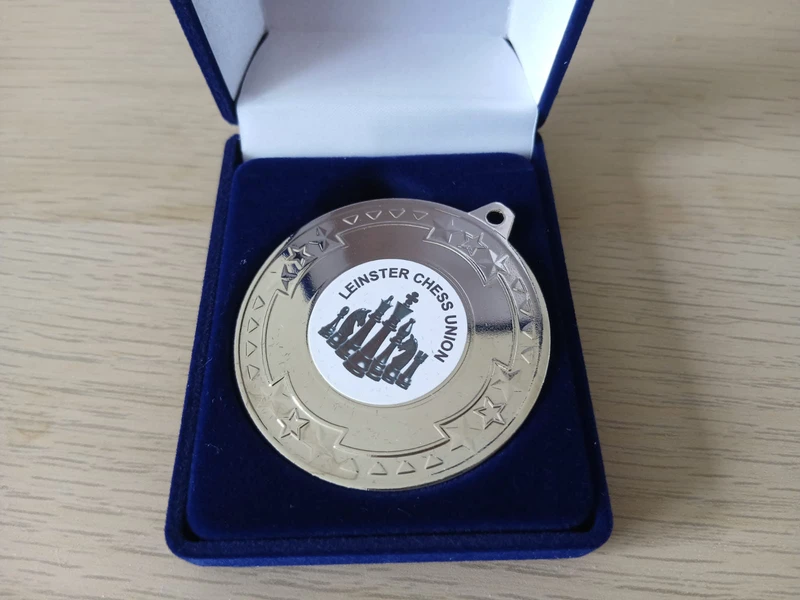
The medal for 2nd place
This was disappointing, but I was pleased with my game and at the end of the day I can only really focus on my own games. Our final chance for promotion was a playoff against Bray/Greystones, who came 2nd in the division 5 BEA Cup South. This is the exact same position we were in last year and unfortunately we lost that playoff. Generally speaking, chess is stronger in South Dublin and surrounding regions than in North Dublin, so were the underdogs but felt quietly confident in our chances.
The match would take place in our clubhouse, which meant we would only get two games with the White pieces. The tie-break would be based on which boards won, so a victory on board 1 was worth 5 points, a victory on board 2 was worth 4 etc. As I was playing White on board 2, it was vital that I secured a victory. My opponent was high rated, but I had just won my section in the Drogheda Congress so I was feeling confident.
The final battle
The game opened with a Petrov and both sides basically copied each other for the first 12 moves. This was an important game so we were playing it safe at first and just testing the water. The first main break to the mirroring was on move 14 when my opponent took with the f-pawn and created a potential weakness in front of their King. I tried to open things up to take advantage of it but my opponent defended and we ended up trading off.
I didn't want to trade too much, but I saw the potential to fork Black's Queen and Rook if I could get my Knight to e6. I was expecting my opponent to counter-attack by moving the Queen to f4, which I would block with my other Knight. Black wouldn't have many good squares for the Rook and I could throw in a check with my Queen and possibly my Knight afterwards. All in all, I would have a lot of threats and a good position. To my surprise, my opponent didn't try to avoid the fork, he just let me have it. So after only 20 moves in the most important game of the season, I was winning.
However, my opponent started pushing a pawn towards my King which left me with a dilemma. Do I make a threat of my own by attacking the undefended Queenside pawns and maybe then the Black King? Or do I play it safe and trade Queens and deprive him of material for an attack? Computer analysis says both ideas are bad but the Queen trade is less bad. But at the time, I felt good and thought I could get my Rook to the 7th rank and attack the pawns. But Black's Knights were concerning so I thought I should bring my Knight forward to force some trades.
After the game, my opponent said he realised too late that this was a blunder that could have cost me the game. Had he moved his Knight to f4, he would threaten my Rook and no matter where I moved it, he would then be able to give check on e2 and win my other Rook. Thankfully, my opponent didn't see this until afterwards and instead moved his other Knight. He was threatening f2, but I decided to ignore the threat and make my own instead. Black had to drop his attack and trade Knights instead, allowing me to give check and start to hunt his pawns.
On move 31, I checked the King and expected to win a pawn, but instead his reaction won me the game. Instead of hiding the King away where it wouldn't be able to do much, my opponent brought the King forward to the centre of the board. In an endgame, this is often an advantage but in this case it lead to disaster. By brining my other Rook to the attack, I still won a pawn and saw that his King was the only thing protecting his Rook. So I gave check with a pawn, leaving the Rook undefended, forcing my opponent to resign.
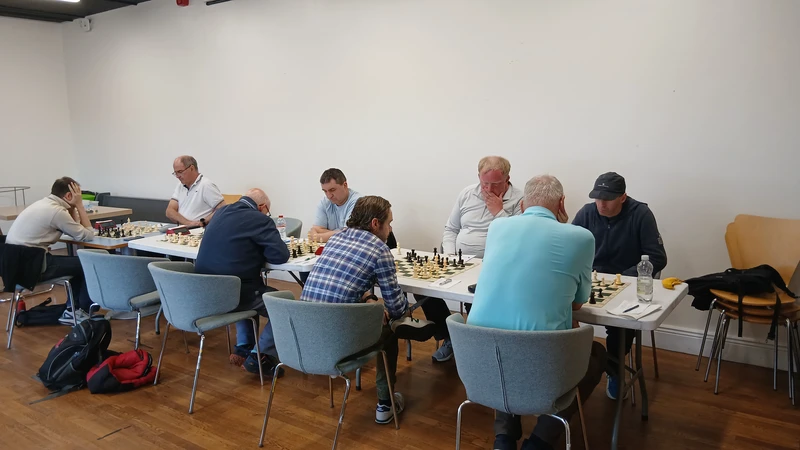
Promotion
I was delighted with my win and as I was the first game to finish, I anxiously waited to see the results of the other game. On board 4, my teammate decided that my win took the pressure off him, so he accepted a draw soon after my game finished. Then I received the great news that out board 1 player had won, which meant that regardless of the other results, we would win on tie-break. In the end, board 3 drew and board 5 lost, which meant the final score was 3-2.
After several tough years of hard work, we have finally won promotion to division 4, the O'Hanlon Cup. This is a great achievement for a small club like ours, as most of our rivals are much larger. I'm especially pleased with my own performance and I scored 9/13 across the season and moved from board 3 to 2. The last games have yet to be rated, but I estimate that they should take me above 1800, a milestone I doubted I would ever see.
Next season starts in September and I'll be sure to let you know how my club handles the new challenge.
You may also like
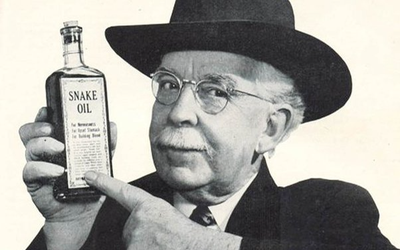 CM HGabor
CM HGaborHow titled players lie to you
This post is a word of warning for the average club player. As the chess world is becoming increasin…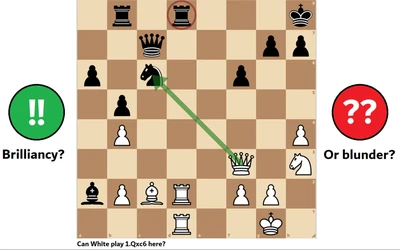 Mcie
McieCalculate until the end.. and one move more!
Blunder or brilliancy, sometimes it all hinges on one more move.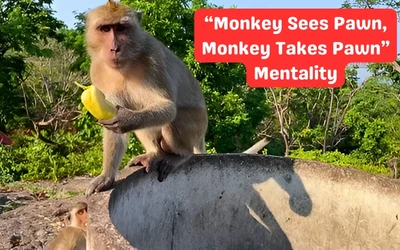 doughnut42
doughnut42How Our Primate Brain Sabotages Winning Positions
Follow very closely as this could well be a reason you struggle to improve in chess. It's not about … TeoKajLibroj
TeoKajLibrojIrish chess continued to grow in 2024
Growth was especially strong for rapid and blitz tournaments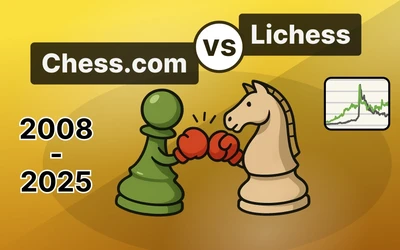 ChessMonitor_Stats
ChessMonitor_StatsWhere do Grandmasters play Chess? - Lichess vs. Chess.com
This is the first large-scale analysis of Grandmaster activity across Chess.com and Lichess from 200… TeoKajLibroj
TeoKajLibroj